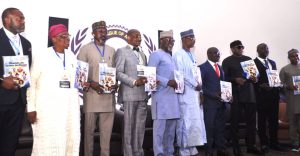Nigeria’s aviation sector lost $3.5Bn in revenue between 2020 and 2022 due to poor infrastructure-Rewane

Bismarck Rewane, the CEO of Financial Derivatives Company, has said that due to poor infrastructure, Nigeria’s aviation sector lost $3.5 billion in revenue between 2020 and 2022.
Rewane disclosed this while speaking on ‘Aviation Financing in Nigeria: Risks, Opportunities and Prospects,’ at the League of Airport and Aviation Correspondents (LAAC) 29th annual conference and awards ceremony held on August 7, 2025, at The Providence Hotel, GRA Ikeja, Lagos.
The CEO of Financial Derivatives Company highlighted while giving an overview of the Nigeria’s Aviation sector that the “Air transport sector contracted by 0.81% in Q1’25, the 6th consecutive quarterly decline;
Nigeria has 32 airports, only 20 were considered viable in 2024, and 92-96% of traffic flows through just 4; Nigeria has 23 active domestic airlines, however 5 airlines control 75% of traffic; The industry is fragmented; Domestic passenger traffic declined for the 2nd straight year to 11.5mn in 2024; while due to poor infrastructure, Nigeria’s aviation sector lost $3.5 billion in revenue between 2020 and 2022.”
He expressed concerns that Nigeria continues to spend billions on airports operations but the air traffic continues to decline and this is not commensurate with the airport operations expenditures.
Rewane stated further that Murtala Muhammed International Airport (MMIA) Lagos Nigeria processes 6.5 million passengers annually and spends 1.75bn dollars to run the airport; Los Angeles Intl (USA) processes 76.5 million passengers and spends 3.5 billion dollars; Heathrow (UK) processes 83.9 million passengers and spends 15.6 billion dollars; Chicago O’Hare Intl (USA) processes 58 million passengers and spends N4.5 billion dollars; Dubai Intl (UAE) processes 92 million passengers and spends 4.0 billion dollars.
He stressed that profitable airlines tend to have modern fleets, strong operational autonomy, and diversified revenue streams, while loss-making airlines often rely on government subsidies, operate in low-demand markets, and suffer from inefficiency or mismanagement.
He opined that the Nigerian aviation sector is in dire need of consolidation as well as need for a competitive hub system, preferably in Lagos, then Abuja.
According to him “We need very strong and effective regulation for safety; concessions and PPPs should be prioritized for airport upgrades to aid national fiscal sustainability and avoid inefficient operations. There should be investment in local maintenance, repair and overhaul hubs.
“Government should focus on policy and regulation, not running airlines or building airports directly and policy consistency is crucial for rebuilding trust with global investors and attract global aviation capital.”
On her part, Mary Olowo-Sokeye, chief financial officer-InterGuide group including Sabre Central and West Africa stated that Airlines require money to operate, remain compliant in a highly regulated environment, stay competitive while prioritizing safety!
“Aviation is the lifeblood of global trade, tourism, and innovation ― but without fuel from financing, it cannot fly,” she said.
She mentioned that some of these methods of funding can range from traditional bank loans and leasing options to more complex structures like asset-backed financing and public offerings.
“With Nigerian airlines averaging 48 percent success rate compared to 81 percent global standards while there is growth in aircraft numbers and passenger numbers, challenges persist in meeting global standards,” Olowo-Sokeye said.
She maintained that there are a lot more airports than Nigeria had 10 years ago and therefore aviation and airlines require funding to be compliant in a highly regulated and competitive environment.
Earlier in his welcome speech, The Chairman League of Airport and Aviation Correspondents (LAAC) Suleiman Idris stated that over nearly three decades, LAAC has remained steadfast in its commitment to fostering this dialogue, accountability, innovation, and progress in the aviation industry. Today’s conference is a continuation of that legacy.
The Nigerian aviation industry, according to him, must also commit to building investor confidence through sound governance, accountability, and a clear vision for the future, adding that this is where collaboration among the government, private sector players, financial institutions, and the media becomes essential.
“As members of the League of Airport and Aviation Correspondents, we see our role not just as reporters, but as facilitators of informed dialogue and accountability.
“Through our stories, investigations, and coverage, we aim to promote transparency, highlight progress, and ensure that key conversations like today’s reach the right ears,” he added.
Idris commended the Managing Director of the Federal Airports Authority of Nigeria (FAAN), Mrs. Olubunmi Kuku, for her strategic reforms that are already yielding visible results; the Managing Director of the Nigerian Airspace Management Agency (NAMA), Engr. Farouk Ahmed, for his continuous work in airspace safety and surveillance; the Rector of the Nigerian College of Aviation Technology (NCAT), Dr. Ismaila Danjuma Adamu, PhD, for sustaining the high standards of aviation training in Zaria; the Registrar of the African Aviation and Aerospace University (AAAU), Dr. Mustapha Sheikh Abdullahi, for his efforts in building an academic platform dedicated to research, development, and capacity-building in aerospace and aviation; the Director General of the Nigerian Meteorological Agency (NiMet), Prof. Charles Anosike, and the Director General of the Nigerian Safety Investigation Bureau (NSIB), Capt. Alex Badeh Jr, for their efforts in aviation weather forecasting and investigations.
The Chairman LAAC acknowledged that their collective works are not only driving progress but also safeguarding the integrity, safety, and sustainability of Nigeria’s aviation industry.
Among the recipients for the LAAC Award include FAAN which received the “Champions of Aviation Development Award” for its Airport Infrastructure Renewal Programme.
The conference also featured the launch of a commemorative publication, “Celebrating Champions of Aviation Development,” recognizing contributions to the sector since 1999.
PHOTO NEWS


Director of Finance and Account, Federal Airport Authority of Nigeria, Representing the MD of FAAN, Mr. Ayodele Olatiregun; Representative of Kebbi State Governor, Mr. Habibu Kamba; Chairman, Association of Aviation Training Organization of Nigeria (AATON), Mr. Bankole Benard; Chairman, Air Peace, Dr. Allen Onyema; Chairman, League of Airport and Aviation Correspondents (LAAC), Mr. Suleiman Idris; CEO of CITA Energies Limited, Dr. Thomas Ogungbangbe and Representative of Former President Goodluck Jonathan, Mr. Ikechukwu Eze during the launch of the LAAC maiden edition Compendium during the 29th Annual League of Airport and Aviation Correspondents (LAAC) Conference Theme: Financing Aviation in Nigeria: Risk, Opportunities, and Prospests, at the Providence hotel, GRA, Ikeja, Lagos.
